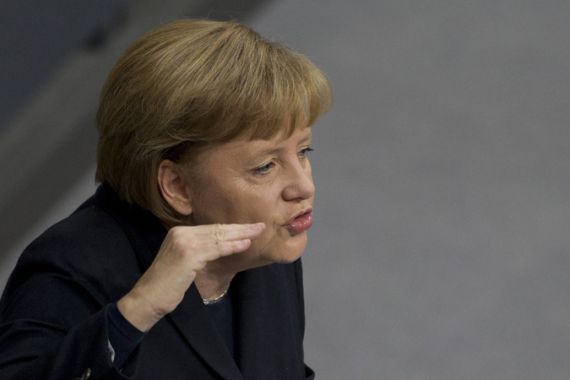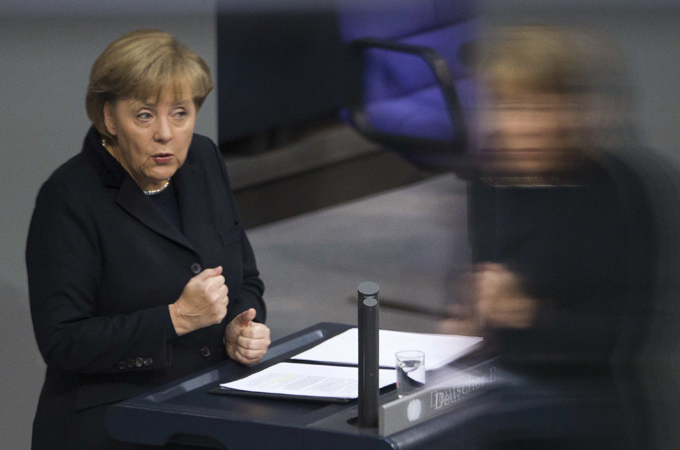Germany suffers from poor bonds sales
Disappointing experience raises fears that the eurozone crisis is beginning to threaten Europe’s strongest economy.

 |
| Merkel has cautioned against meddling with the European Central Bank’s strict inflation-fighting mandate [Reuters] |
A disappointing bond sale by Germany has raised fears that Europe’s debt crisis is beginning to threaten the eurozone’s strongest economy.
Financial markets were also unnerved on Wednesday by newspaper reports that Belgium may be pressing France for an expansion of a $120bn bailout of the failed bank, Dexia.
Keep reading
list of 4 itemsOne of the biggest hurdles for athletes on the Olympic path: Money
Key takeaways from Xi Jinping’s Europe trip
When will EVs become mainstream in the US?
On top of this, a special report by Fitch Ratings suggested France had limited room left to absorb shocks to its finances, such as a new downturn in growth or support for banks, without endangering its cherished AAA credit status.
After one of the least successful debt sales by Germany since the launch of the single currency, the euro fell and European shares sank to seven-week lows.
Signs that European banks are increasingly shut out of credit markets and reliant on the European Central Bank (ECB) for funding have added to pressure for the bloc’s leaders to find a broad and lasting solution to the crisis.
Franco-German clash
Germany and France clashed again on Wednesday over whether the ECB should take bolder steps to ease the pressure on debt markets in Italy, Spain and others which is now at the heart of the crisis.
In a forceful speech to the Bundestag lower house of parliament, Chancellor Angela Merkel issued one of her starkest warnings yet against meddling with the central bank’s strict inflation-fighting mandate.
She also hit back at proposals from the European Commission on joint eurozone bond issuance, calling them “extraordinarily inappropriate”.
“The European currency union is based, and this was a precondition for the creation of the union, on a central bank that has sole responsibility for monetary policy. This is its mandate. It is pursuing this. And we all need to be very careful about criticising the European Central Bank,” Merkel said.
“I am firmly convinced that the mandate of the European Central Bank cannot, absolutely cannot, be changed.”
Shortly before she began speaking, Francois Baroin, the French finance minister, offered a polar opposite view on the ECB’s role, telling a conference in Paris that it was the central bank’s responsibility to sustain activity in the currency bloc.
“The best response to avoid contagion in countries like Spain and Italy is, from the French viewpoint, an intervention (or) the possibility of intervention or announcement of intervention by a lender of last resort, which would be the European Central Bank,” Baroin said.
Divided leadership
The very public disagreement underscores just how divided European leaders are on how to resolve the turmoil which has accelerated to engulf big countries like Italy and Spain, and pushed out leaders in Italy and Greece.
With time running out for politicians to forge a crisis plan that is seen as credible by the markets, the European Commission presented a study on Wednesday of joint euro zone bonds as a way to stabilise debt markets.
In her speech, Merkel pointed to repeated violations of the EU’s Stability and Growth Pact in the currency area’s first decade, saying they had damaged market faith in the bloc’s ability and willingness to crack down on fiscal rule-breakers.
“And this is why I find it extraordinarily inappropriate that the European Commission is suggesting various options for euro bonds today – as if they were saying we can overcome the shortcomings of the currency union’s structure by collectivising debt. This is precisely what will not work,” Merkel said.
She also sent a clear warning to Antonis Samaras, the leader of conservative New Democracy in Greece, who has resisted pressure to join other political parties and make a written commitment to painful austerity measures.
Merkel said Greece would not receive an $11bn aid tranche it needs to avert a default next month unless Samaras signed the pledge.
Merkel raised pressure on the bloc to finalise plans for a “leveraging” of its rescue fund and a recapitalisation of vulnerable banks, saying guidelines were needed by the time European finance ministers meet on November 29 to 30.
“The fact that we have been talking about [bank recapitalisations] for weeks but still have no clarity, is not very reassuring,” she said. “And yesterday we saw with the example of one German bank how fragile the banks themselves are.”